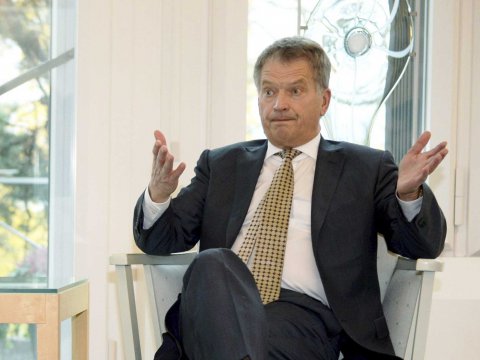. Universities to enlist more foreign students by 2020
By Nnanna Okere
By easing the application process, the Lappeenranta University of Technology hopes to double the number of foreign students enrolling in its graduate programme over the next few years. Four other schools are involved in Finnish education export company Edunation’s international effort, which hope to attract Chinese and Indian students in particular.
Five Finnish institutions of higher education, together with education export company Edunation, are aiming to bring 150,000 new foreign students into their programmes by the year 2020.
Edunation first contacted the Lappeenranta University of Technology (LUT) and signed a deal to double the school’s enrolment figures from abroad, especially from China and India.
The names of the rest of the domestic institutions involved will be announced in the near future, says Edunation Director Tuomas Kauppinen.
“More than half of the world’s exchange students come from Asian countries. We also have involvement in Argentina and Nigeria,” he says.
Applications for residence permits from higher education students from outside the 31 countries of the European Economic Area have fallen by a close to a quarter, after Finland’s government decided last year to charge these students’ tuition.
The Finnish Immigration Service says about 4,300 foreign students had applied for the permits as of late September 23 percent less than the previous year.
App in development
In order to achieve its high student target in the allotted time, Edunation is developing a mobile phone-based student selection tool for schools to use.
The app would allow students to receive information on their enrolment just one day after they have sent in their applications. Kauppinen says that enrolling foreign students in Finnish universities is a top priority.
“This is one way for Finland to start to correct its workforce shortage, and networking is imperative in a global community,” Kauppinen says.
Clunky system overhauled
LUT’s international affairs manager Janne Hokkanen says that Edunation is in a key position when the school starts its running enrolment search later this year, continuing into May.
“The current Finnish application process is extremely complex and clunky, and one of the main challenges in international recruitment,” Hokkanen says. “But we have a new method that is meant to give prospective students alternatives to that.”
Under the new system. which is separate from the Edunation programme, people can apply to LUT almost year round, and those accepted will receive word of it one month after the application at the latest, enabling them to begin their studies the following autumn.
“Receiving word of acceptance as soon as possible makes life much easier for students,” Hokkanen says.
Rolling application process
In later years, the rolling application process would run from September to May. A continuous process is the international way to go, says Hokkanen, adding: “I’m sure we will be the first in Finland to launch this method.”
LUT will also organise a traditional annual student application round as usual. The guidelines for enrolment are different in the two systems.
“In the normal phase, we choose the 20 best applicants. The continuous round will have a set minimum limit, and anyone who passes it will be accepted,” Hokkanen explains.
.Sources Yle
Finland criticises Turkey after WSJ journalist’s jail judgement
Reports that Turkey sentenced a dual Finnish-Turkish national – who’s a writer at the Wall Street Journal – to more than two years in prison in absentia has shocked many in Finland.
Foreign Minister Toimi Soini said that Turkey’s stance on freedom of the press and speech are taking on disturbing features. He noted that the court decision to impose a jail sentence of just over two years for the Finnish-Turkish journalist Ayla Albayrak, a writer for the Wall Street Journal, was a consequence of this development.
Albayrak was found guilty in absentia of producing terrorist propaganda and supporting Kurdish separatists by the Turkish court, after writing a 2015 story about the Turkish government’s conflict with the Kurds.
The Finnish Foreign Ministry has made contact with Albayrak, who is currently in New York. The ministry has also contacted Turkish authorities.
Soini says he has already spoken of his concerns to Turkish leaders, and plans to speak about it again.
“We’ll see when the next opportunity comes around. The last time I brought up human rights issues was in New York (in late September). I told (Turkish Foreign Minister) Mevlut] Cavusoglu that Turkey must implement the rule of law,” he said.
“Even if the situation is not satisfactory, I don’t think Turkey wants to get rid of all its journalists, that wouldn’t be sensible. The situation is problematic when it comes to journalism, and we must say that to them and we have,” the Minister lamented.
However, Finnish opposition MP Ozan Yanar said that Soini fell short in his comments via Twitter, writing that, “it is not enough to say that the Turkish situation is problematic when a Finnish reporter gets a prison term for journalism.” Yanar was born in Turkey and holds dual citizenship.
The Finnish chair of the International Press Institute, Kaius Niemi, says that journalists in Turkey are very hard-pressed right now and that the situation in Turkey is exceptional.
“There are more journalists in prison right now in Turkey than anywhere else in the world. The state of emergency that was called after the failed coup in particular has enabled Turkey’s President Recep Tayyip Erdogan to grab onto a fabricated reason to use the legal system to crack down on the opposition and people who are critical of the government,” says Niemi, who is also chief editor of Finland’s largest daily, Helsingin Sanomat.
He does not see any indication that things in Turkey will change for the better, either. He says it is up to the international community, including the governments of Finland and other EU states, to put pressure on Turkey before the situation can be even somewhat rectified.
“Turkey seeks to prevent journalists working for foreign media services from working in the Turkish region by prosecuting them and sentencing them in absentia,” he noted.
Switzerland’s new ten-franc banknote unveiled
The Swiss National Bank has revealed the country’s new ten-franc note, which will go into circulation on18th of October 2017.
The latest in the new series of banknotes that is being issued in stages, the ten franc note follows the 50 franc and 20 franc notes that entered circulation in April 2016 and May 2017 respectively.
Each note in the new series depicts a characteristic of Switzerland, illustrated by various graphic elements including a hand and the globe, which appear on every note.
The ten-franc note focuses on Switzerland’s organizational talent, expressed in the key motif of time, said the SNB in a statement.
The new note is the same colour as its predecessor but as with all the new notes is smaller and has more sophisticated design and security features than the previous banknote series.
The next in the series, the 200 franc note, will be issued in autumn 2018, followed by the 1000 franc and 100 franc notes during 2019, said the bank.
It would be recalled Switzerland’s new 50 franc banknote, released last year won the ‘banknote of the year award 2016’ voted by the members of the International Bank Note Society (IBNS).
Over 120 new banknotes were released worldwide in 2016, with over half of sufficiently new design to be eligible for the award, said the IBNS in a statement.
Aiming to recognize an “exceptional” banknote, the judges consider the artistic merit, design, use of colour, contrast, balance, and security features of each nomination.
The Swiss note was the “narrow winner” over three runners-up, a 1,000 Rufiyaa note from the Maldive Islands, a 500 peso note from Argentina and the Royal Bank of Scotland’s five pound note.
Courtesy: Swiss National Bank
German journalist goes on trial in Turkey over ‘terror group membership’
A German journalist and translator went on trial in Turkey on Wednesday charged with membership of a banned radical leftist group, one of several cases, which have led to a crisis in relations between Ankara and Berlin.
Mesale Tolu, 33, initially detained in late April, is charged with membership of the Marxist-Leninist Communist Party (MLKP), which is outlawed in Turkey as a terror group.
She is one of several German nationals detained under the state of emergency imposed in Turkey after the failed coup attempt on July last year, in a crackdown Berlin has criticised as excessive.
Tolu went on trial at a court in Silivri outside Istanbul along with 17 others charged in the same case. If convicted, she faces up to 15 years in jail.
Tolu, who worked as a reporter and translator for the leftwing ETHA news agency, is being held in the Bakirkoy women’s prison in Istanbul. Her three-year-old son is with her there.
The hearing began with Tolu’s defence and she denied the charges against her, the Law Office of the Oppressed, which is representing her, said.
“I do not accept the accusations made against me in the indictment. I was targeted by the police because of the translation I had done for ETHA,” it quoted her as saying on its Twitter account.
She is being accused of attending funerals for MLKP militants and demonstrations of the banned group, but supporters see the case as politically motivated.
“All the accusations are lies and empty,” her father Ali Riza said outside the court, quoted by ETHA on its Facebook page.
Also in jail, but yet to go on trial, is Deniz Yucel, the German-Turkish correspondent of Germany’s Die Welt newspaper who was arrested in February on charges of terror propaganda. President Recep Tayyip Erdogan has personally described him as a “terror agent”.
In a separate case, German activist Peter Steudtner is one of 11 campaigners held by Turkey on charges of backing a terror group after a raid by the authorities on a workshop run by Amnesty International.
Critics say there has been a drastic decline in press freedom under Erdogan’s rule, particularly in the wake of the failed coup.
According to the P24 press freedom group, there are 170 journalists behind bars in Turkey.
The Wall Street Journal said recently that one of its reporters was jailed in absentia for two years and one month on charges of publishing “terror propaganda” in an article on clashes between the Turkish army and outlawed Kurdish militants.












